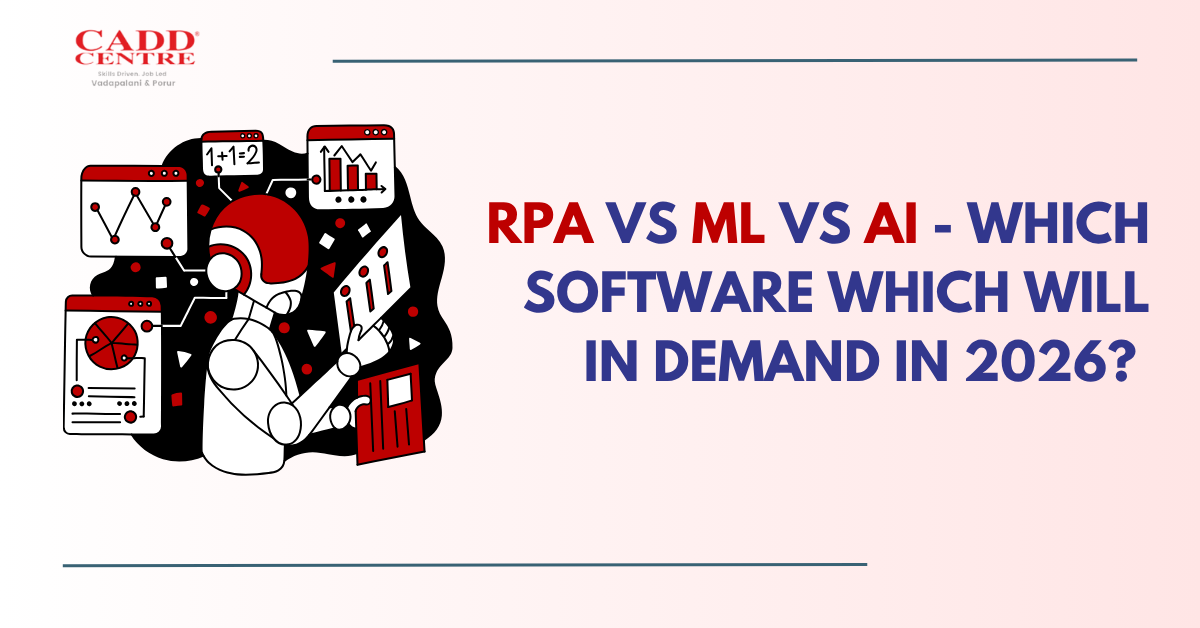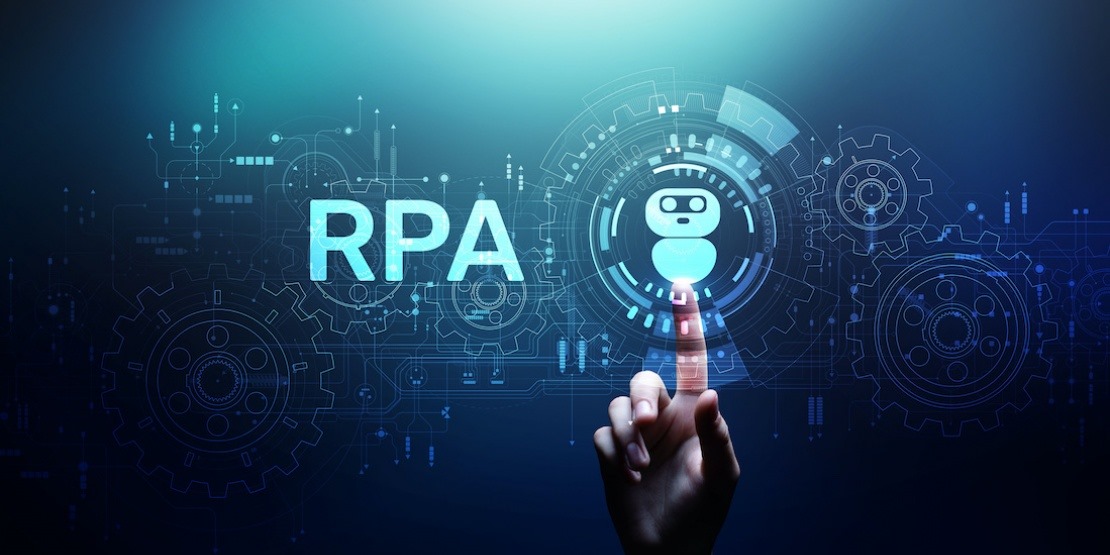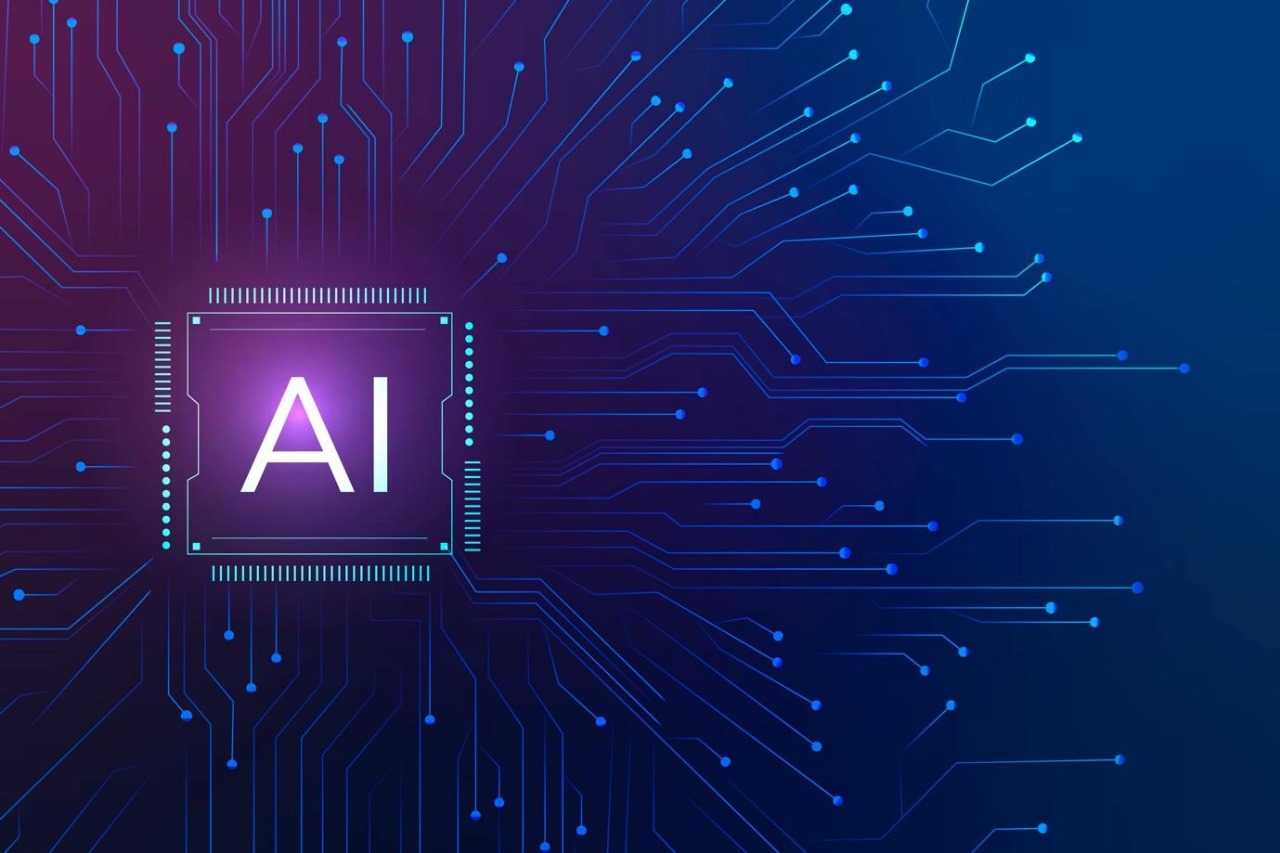RPA vs ML vs AI – Which Software Which Will Be in Demand in 2026?

Our world is slowly evolving into the era of Aritificial intelligence and robotic machine learning techniques to make their daily life habits and work life more simpler. Before learning and train yourself with these software and technologies, it is crucial to know how these differ from each other. When new technologies develop, it becomes rather difficult to distinguish between one and the other and this is where the debate of RPA vs ML vs AI begins.
There is added challenge, especially if one is new in the market or industry in question. Though both the technologies are somewhat related, there are differences between the three.
AI ML RPA - How to define them?
Machine learning is one of the categories of AI that involves the use of statistical models to help the computer make decision without having to encode. RPA technology, compared to ML is a software that helps non-technical persons or machines to perform high volume of related tasks like human actions.

Client world is the best of both worlds where the use of ML and RPA technology is featured in its numerous solutions that enables to automate business processes and accumulate big data information.
RPA vs AI vs ML - Robotic process automation :
Robotic process automation or RPA is defined as a technique which may enable organizations to develop, implement and monitor software robots imitating human actions with digital systems and software.

By knowing the difference between RPA and machine learning helps one understand that each aspect can be suitable for any business.
RPA vs AI vs ML - Artificial Intelligence
AI is a concept of endowing machines with human like intellect, skills to learn as well as the ability to solve problems. It is the process whereby virtual machines or systems generate an ability to learn from patterns and make decisions from such patterns without being explicitly programmed to do so. AI generally means the capacity to apply artificial intelligence in various areas of a business that may include natural language processing, image recognition, and more.
RPA vs AI vs ML - Machine Learning
Machine learning (ML) is a subset of artificial intelligence (AI) and computer science that use statistical techniques to train programmable models to learn like humans do, and improve on the performance with time.
RPA vs AI vs ML - Major Similarities
RPA vs AI vs ML all three of these software tools are used in order to virtually replicate motion and execute operations and tasks with relative ease and at a quicker pace for business corporations particularly the small ones who lack the capital to avail many resources.
These tools in integration can help a business in attaining intelligent process automation. This automation makes it possible for organisations to advance towards total digitalisation, in which they use technology to get work done with customers.
Also Machine Learning and AI go hand in hand with each other. Machine learning in turn is part of artificial intelligence, although it is sometimes considered as being synonymous with it.
RPA vs AI vs ML - Use cases of RPA AI and Machine learning in real-world

RPA vs AI vs ML - Applications of AI -
- AI is capable of performing high-level tasks that call for decision making of any sort of reasoning and this includes the identification of patterns, planning and natural language processing.
- AI incorporates the utilization of big data and sophisticated approaches including machine learning as well as deep learning to make proper decisions.
- AI in process automation is capable of learning and enhancing its performance, automatically, from data and feedbacks as and when called upon to do so.
- AI tends to be applied to jobs where a lot of intelligence is involved including fraud analysis, customer relations and writing among others.
RPA vs AI vs ML - Applications of RPA:
- RPA, however, targets at automated end-to-end business processes and specifically rote tasks that only require decision making, data entry, form filling, and invoice processing among others.
- As it has been created to mimic actions pre-coded in the rules and decision trees, it is not based on high algorithms and machine learning.
- RPA can help in enhancement of quality and speed of the process together with the decrease of errors made by hand, and is not limited to certain fields such as finance, healthcare and manufacturing.
RPA vs AI vs ML - Applications of ML:
- As a subfield of AI, ML does not revolve around automating a singular job in a process
- In these contexts ML and RPA could be combined where an RPA bot receives a result from an ML algorithm and transfers it to the relevant systems.
- This can be a bit risky when trying to determine the difference between RPA and ML, but as you will see, the method used to address these services is different.
RPA vs AI vs Machine Learning - Difference between AI, RPA, and ML

ML vs RPA
The major difference between machine learning and RPA can only work up to the rules that have been set for it. Unlike traditional applications, ML applications work a little more autonomously to make decisions on their own following what they learn. RPA vs Machine learning is known by its differences, use cases and its application in the industry.
In Robotics process automation Vs Machine learning, RPA is confined to mimicking human activity, the ML solutions attempt to mimic how we process information as well as how we learn. Another crucial distinction that has to be made when considering robotic process automation vs. machine learning is how it operates.
RPA vs AI
Robotic process automation and Artificial intelligence are different from each other because it employs different and higher algorithms, different and large data sets, and complex models to learn and make decision. RPA on the other hand is easy as it is based on rules and processes that have been set earlier. AI in RPA can be extended to accommodate larger and complicated business Models.
Artificial intelligence and RPA is capable of being more scalable since it is capable of learning from data and feedback as well as new, adapting process. RPA may need a certain amount of programming to apply for the new processes or may need specific manual inputs. AI and RPA are definitely related but they are both have their distinct advantages and disadvantages and the best one to choose depends on the business requirements and processes.
RPA in AI should be analyzed by firms with an objective of comparing the intended goals, available resources, and the resources that are required in order to meet the set goals within the predetermined time span and cost.
ML vs AI
It can also be relevant to point out that Machine Learning and AI is also interrelated. Well, Machine Learning is even subfield of AI. Machine learning rely with AI tripod for learning with the relationship between tasks and learning that AI follows on the way of mimicking with the task.
While RPA vs ML vs AI may refer actual distinct technologies and varieties of automation, some of these cases have clearly demonstrated that their strength is not in an individual application. Intelligent automation that collaborates or ‘cooperates’ by sharing these tools is the future for tomorrow’s leading businesses.
Robotic process automation and AI is in the light of communication, decision making and consequential systematic execution of those efforts into business essential insights, your business opens up to more capabilities of getting more for the least. So, coordinating RPA with AI and ML and all these tools may help a business in getting intelligent process automation. Such automation helps to advance businesses towards the state of a complete reliance on technology to get tasks, projects, and customers accomplished.
FAQs
1. RPA vs Machine Learning which is better?
This varies based on the industry we use in, RPA can only work with rules. While conventional applications are somewhat more distinguished in their operations and in making of decisions based on what they learn, ML applications operate somewhat more independently. Instead of thinking about RPA vs ML, it is advisable to learn about ML integrated RPA.
2. What is AI powered RPA?
Currently in development and implemented AI-assisted RPA is used to analyse, for instance, unstructured data sources like emails, documents, and social media feeds.
3. RPA vs AI vs ML, which is in more demand in 2024?
All the three software are interconnected with each other, RPA plays a important role in easing the work of a human in structural industries like civil, mechanical and automobile. Whereas ML and AI is a crucial tool in the IT industry for more accurate analysis.
4. Which is the best software technology to learn in 2026 among RPA vs AI vs ML?
RPA is growing technology undoubtedly, there is a strong demand for RPA developers to date and the situation is only expected to improve. The above data reveals various research and survey reports which suggests that the CAGR will be above 30% and it is expected that the market size of AI will be around $30 billion in 2028.


